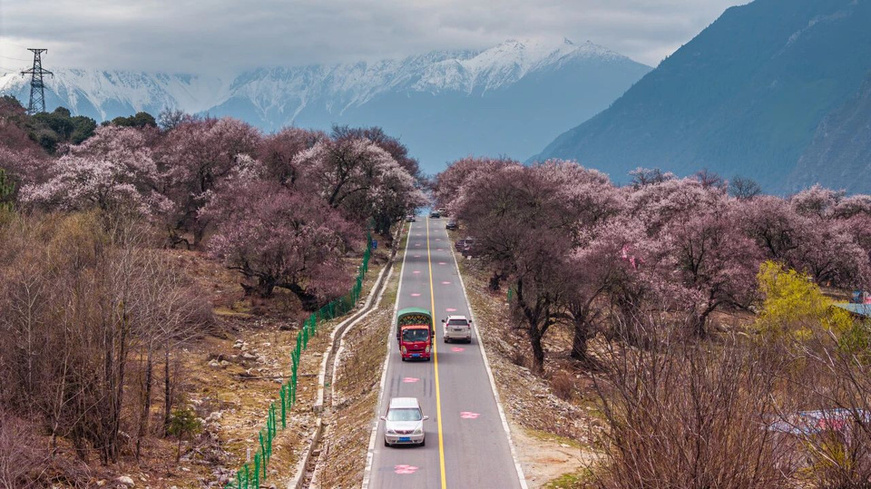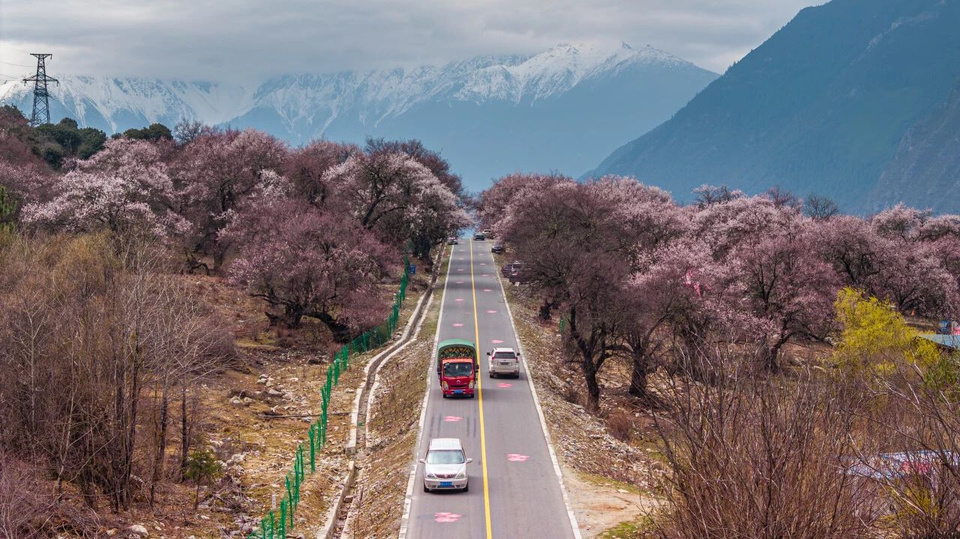By Lu Tao, Xu Yuyao, People's Daily

Vehicles drive on a road lined by peach blossoms by its sides. (Photo by Zhang Wujun/People's Daily)
Each March to April each year, Nyingchi in southwest China's Xizang autonomous region transforms into a sea of peach blossoms.
Along the banks of roaring rivers, in emerald-green highland barley fields, and beneath towering snow-capped peaks, trees burst into bloom - blush pink petals painting the landscape - a spectacle drawing throngs of tourists.
Most of Nyingchi's peach trees are wild, encompassing approximately 3 million, many of which are three to five centuries old.
What makes wild peach blossoms favor Nyingchi?
"Located in the southeastern part of the Qinghai-Xizang Plateau, Nyingchi benefits from a relatively warm and humid climate. Abundant water resources from rivers such as the Yarlung Zangbo and the Parlung Zangbo provide the conditions needed for large expanses of peach trees to thrive," explained Xing Zhen, vice president of Xizang Agricultural and Animal Husbandry University.
Wild peach trees have plenty of space to grow naturally in Nyingchi, and the local varieties possess strong resistance to pests and diseases, contributing to their multi-century lifespans, Xing added.
Recently, the "22nd Xizang Nyingchi Peach Blossom Tourism and Culture Festival" kicked off, running for a month. A variety of vibrant events have drawn crowds from near and far, with sub-venues established across different districts and counties, immersing visitors a series of spectacular blossom celebrations.
At the sub-venue of the Bayi District in Duodang Village, Bujiu Township, thousands of mu (about 667 square meters) of peach blossoms are in full bloom, while high-speed trains gliding through the vibrant floral landscape.
Amidst the peach orchards, lively song and dance performances delight the crowd, traditional cultural activities enjoy widespread popularity, and food stalls draw long queues of visitors.
"During last year's festival, our village generated more than 220,000 yuan ($30,190.75) solely from ticket sales. We anticipate similarly significant revenue this year," said Sonam Norpu, head of Duodang village.
Thanks to the festival's growing popularity, local hospitality sectors such as catering and lodging have seen booming business in recent years. As night falls in Suosong village, nestled at the foot of Namjagbarwa Peak - the cultural celebrations maintain their momentum. Courtyards glow with bonfires, singers strum guitars on open-air stages, and visitors join local villagers in traditional dances, immersing themselves in the unique charm of Xizang culture under a canopy of peach flowers and starlight.
Suosong village now boasts 53 homestays and family-run inns. The village forms part of the Yarlung Zangbo Grand Canyon Scenic Area, which welcomed 658,500 tourists in 2024, generating tourism revenue exceeding 106 million yuan. Local homestay operator Jigme Dorje, said all 30 rooms had been booked well ahead of this year's festival. "Peach blossoms have truly blossomed into flowers of prosperity!" he said.
"Using flowers as a bridge, cultural tourism has become one of the most dynamic strategic pillar industries in Nyingchi," said an official from the Nyingchi municipal bureau of culture and tourism. Since the beginning of this year, the city's total tourism revenue has increased by about 12% year on year, accompanied by a 20% expansion in cultural-related industries output value.
National Highway 318, renowned for steep mountains and rugged terrain, remains hallowed ground for adventure enthusiasts. Traveling to Nyingchi along this route transforms into a romantic dialogue with spring's awakening.
"This journey has been smooth and scenic. We've stopped many times along the way to admire the peach blossoms. It's absolutely stunning," said Zhang Lanping, a tourist from southwest China's Chongqing municipality, who drove all the way to Gala village in Bayi district.
In Bomi county, a 207-kilometer stretch of National Highway 318 carves through towering mountains. Over the years, efforts of tunnel and bridge constructions, and roadway expansions have never ceased.
"National Highway 318 is like a hada (ceremonial scarf), weaving together regional development with future aspirations," said Yang Li, head of the Bomi county. To ensure that visitors can fully enjoy the peach blossoms and stay comfortably, the county has invested in upgrading infrastructure, including RV campsites and improved public restrooms along the highway. Today, Bomi boasts over 400 hotels, inns, and guesthouses, accommodating more than 2.63 million travelers in 2024 alone.
Beyond National Highway 318, infrastructure improvements continue to drive accessibility. The Lhasa–Nyingchi Expressway opened in 2019; the Lhasa–Nyingchi Railway began operation in 2021; in 2024, passenger throughput at Nyingchi Mainling Airport surpassed 700,000 for the first time.
Visitors from all directions now gather in Nyingchi for this radiant peach blossom rendezvous. As the blossoms bear witness to Nyingchi's rapid development, they will continue to shine light on the ever-brighter future of this "pearl of the snowy plateau."
Along the banks of roaring rivers, in emerald-green highland barley fields, and beneath towering snow-capped peaks, trees burst into bloom - blush pink petals painting the landscape - a spectacle drawing throngs of tourists.
Most of Nyingchi's peach trees are wild, encompassing approximately 3 million, many of which are three to five centuries old.
What makes wild peach blossoms favor Nyingchi?
"Located in the southeastern part of the Qinghai-Xizang Plateau, Nyingchi benefits from a relatively warm and humid climate. Abundant water resources from rivers such as the Yarlung Zangbo and the Parlung Zangbo provide the conditions needed for large expanses of peach trees to thrive," explained Xing Zhen, vice president of Xizang Agricultural and Animal Husbandry University.
Wild peach trees have plenty of space to grow naturally in Nyingchi, and the local varieties possess strong resistance to pests and diseases, contributing to their multi-century lifespans, Xing added.
Recently, the "22nd Xizang Nyingchi Peach Blossom Tourism and Culture Festival" kicked off, running for a month. A variety of vibrant events have drawn crowds from near and far, with sub-venues established across different districts and counties, immersing visitors a series of spectacular blossom celebrations.
At the sub-venue of the Bayi District in Duodang Village, Bujiu Township, thousands of mu (about 667 square meters) of peach blossoms are in full bloom, while high-speed trains gliding through the vibrant floral landscape.
Amidst the peach orchards, lively song and dance performances delight the crowd, traditional cultural activities enjoy widespread popularity, and food stalls draw long queues of visitors.
"During last year's festival, our village generated more than 220,000 yuan ($30,190.75) solely from ticket sales. We anticipate similarly significant revenue this year," said Sonam Norpu, head of Duodang village.
Thanks to the festival's growing popularity, local hospitality sectors such as catering and lodging have seen booming business in recent years. As night falls in Suosong village, nestled at the foot of Namjagbarwa Peak - the cultural celebrations maintain their momentum. Courtyards glow with bonfires, singers strum guitars on open-air stages, and visitors join local villagers in traditional dances, immersing themselves in the unique charm of Xizang culture under a canopy of peach flowers and starlight.
Suosong village now boasts 53 homestays and family-run inns. The village forms part of the Yarlung Zangbo Grand Canyon Scenic Area, which welcomed 658,500 tourists in 2024, generating tourism revenue exceeding 106 million yuan. Local homestay operator Jigme Dorje, said all 30 rooms had been booked well ahead of this year's festival. "Peach blossoms have truly blossomed into flowers of prosperity!" he said.
"Using flowers as a bridge, cultural tourism has become one of the most dynamic strategic pillar industries in Nyingchi," said an official from the Nyingchi municipal bureau of culture and tourism. Since the beginning of this year, the city's total tourism revenue has increased by about 12% year on year, accompanied by a 20% expansion in cultural-related industries output value.
National Highway 318, renowned for steep mountains and rugged terrain, remains hallowed ground for adventure enthusiasts. Traveling to Nyingchi along this route transforms into a romantic dialogue with spring's awakening.
"This journey has been smooth and scenic. We've stopped many times along the way to admire the peach blossoms. It's absolutely stunning," said Zhang Lanping, a tourist from southwest China's Chongqing municipality, who drove all the way to Gala village in Bayi district.
In Bomi county, a 207-kilometer stretch of National Highway 318 carves through towering mountains. Over the years, efforts of tunnel and bridge constructions, and roadway expansions have never ceased.
"National Highway 318 is like a hada (ceremonial scarf), weaving together regional development with future aspirations," said Yang Li, head of the Bomi county. To ensure that visitors can fully enjoy the peach blossoms and stay comfortably, the county has invested in upgrading infrastructure, including RV campsites and improved public restrooms along the highway. Today, Bomi boasts over 400 hotels, inns, and guesthouses, accommodating more than 2.63 million travelers in 2024 alone.
Beyond National Highway 318, infrastructure improvements continue to drive accessibility. The Lhasa–Nyingchi Expressway opened in 2019; the Lhasa–Nyingchi Railway began operation in 2021; in 2024, passenger throughput at Nyingchi Mainling Airport surpassed 700,000 for the first time.
Visitors from all directions now gather in Nyingchi for this radiant peach blossom rendezvous. As the blossoms bear witness to Nyingchi's rapid development, they will continue to shine light on the ever-brighter future of this "pearl of the snowy plateau."
 Menu
Menu
 Peach blossoms in full bloom draw visitors from afar to Nyingchi, Xizang
Peach blossoms in full bloom draw visitors from afar to Nyingchi, Xizang
















